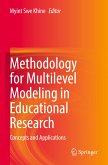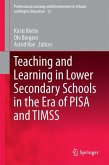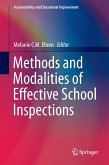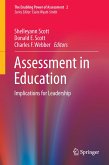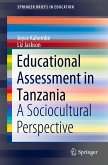Methodology for Multilevel Modeling in Educational Research
Concepts and Applications
Herausgegeben:Khine, Myint Swe
Methodology for Multilevel Modeling in Educational Research
Concepts and Applications
Herausgegeben:Khine, Myint Swe
- Gebundenes Buch
- Merkliste
- Auf die Merkliste
- Bewerten Bewerten
- Teilen
- Produkt teilen
- Produkterinnerung
- Produkterinnerung
This edited volume documents attempts to conduct systematic and prodigious research using multilevel analysis in educational settings, and present their findings and identify future research directions. It showcases the versatility of multilevel analysis, and elucidates the unique advantages in examining complex and wide-ranging educational issues. This book brings together leading experts around the world to share their works in the field, highlighting recent advances, creative and unique approaches, and innovative methods using multilevel modeling and theoretical and practical aspects of…mehr
Andere Kunden interessierten sich auch für
![Methodology for Multilevel Modeling in Educational Research Methodology for Multilevel Modeling in Educational Research]() Methodology for Multilevel Modeling in Educational Research129,99 €
Methodology for Multilevel Modeling in Educational Research129,99 €![Teaching and Learning in Lower Secondary Schools in the Era of PISA and TIMSS Teaching and Learning in Lower Secondary Schools in the Era of PISA and TIMSS]() Teaching and Learning in Lower Secondary Schools in the Era of PISA and TIMSS41,99 €
Teaching and Learning in Lower Secondary Schools in the Era of PISA and TIMSS41,99 €![Methods and Modalities of Effective School Inspections Methods and Modalities of Effective School Inspections]() Methods and Modalities of Effective School Inspections81,99 €
Methods and Modalities of Effective School Inspections81,99 €![Educational Research in China Educational Research in China]() Educational Research in China105,99 €
Educational Research in China105,99 €![Assessment in Education Assessment in Education]() Assessment in Education81,99 €
Assessment in Education81,99 €![Educational Assessment in Tanzania Educational Assessment in Tanzania]() Joyce KahembeEducational Assessment in Tanzania41,99 €
Joyce KahembeEducational Assessment in Tanzania41,99 €![Educational Research in China Educational Research in China]() Educational Research in China81,99 €
Educational Research in China81,99 €-
-
-
This edited volume documents attempts to conduct systematic and prodigious research using multilevel analysis in educational settings, and present their findings and identify future research directions. It showcases the versatility of multilevel analysis, and elucidates the unique advantages in examining complex and wide-ranging educational issues. This book brings together leading experts around the world to share their works in the field, highlighting recent advances, creative and unique approaches, and innovative methods using multilevel modeling and theoretical and practical aspects of multilevel analysis in culturally and linguistically-diverse educational contexts.
Produktdetails
- Produktdetails
- Verlag: Springer / Springer Nature Singapore / Springer, Berlin
- Artikelnr. des Verlages: 978-981-16-9141-6
- 1st edition 2022
- Seitenzahl: 440
- Erscheinungstermin: 11. April 2022
- Englisch
- Abmessung: 241mm x 160mm x 30mm
- Gewicht: 822g
- ISBN-13: 9789811691416
- ISBN-10: 981169141X
- Artikelnr.: 63049523
- Herstellerkennzeichnung Die Herstellerinformationen sind derzeit nicht verfügbar.
- Verlag: Springer / Springer Nature Singapore / Springer, Berlin
- Artikelnr. des Verlages: 978-981-16-9141-6
- 1st edition 2022
- Seitenzahl: 440
- Erscheinungstermin: 11. April 2022
- Englisch
- Abmessung: 241mm x 160mm x 30mm
- Gewicht: 822g
- ISBN-13: 9789811691416
- ISBN-10: 981169141X
- Artikelnr.: 63049523
- Herstellerkennzeichnung Die Herstellerinformationen sind derzeit nicht verfügbar.
Dr. Myint Swe Khine is an Adjunct Professor in the School of Education at Curtin University, Australia. He holds Masters degrees from the University of Southern California, Los Angeles, United States, University of Surrey, Guildford, United Kingdom, and University of Leicester, United Kingdom, as well as Doctor of Education from Curtin University, Australia. He was a full Professor and Chair of the Assessment and Evaluation Centre at the Emirates College for Advanced Education in the United Arab Emirates, and also worked at the Learning Sciences and Technology Academic Group, National Institute of Education at Nanyang Technological University, Singapore. He is serving as an Editorial Board member of several international journals. He publishes widely in academic journals, and has edited over forty books.
Introduction: Hierarchical Linear Modeling and Multilevel Modeling in Educational Research.- Theoretical Foundations and Conceptual Frameworks: A Primer for Using Multilevel Confirmatory Factor Analysis Models in Educational Research.- Multilevel Model Selection: Balancing Model Fit and Adequacy.- Concepts and Applications of Multivariate Multilevel (MVML) Analysis and Multilevel Structural Equation Modeling (MLSEM).- Data Visualization for Pattern Seeking in Multilevel Modeling.- Doubly Latent Multilevel Structural Equation Modeling: An Overview of Main Concepts and Empirical Illustration.- Doubly Latent Multilevel Structural Equation Modeling: An Overview of Main Concepts and Empirical Illustration: Analyzing Large-scale Assessment Data with Multilevel Analyses: Demonstration using the Programme for International Student Assessment (PISA) Data.- Multilevel Modeling of International Large-scale Assessment Data.- Transparency and Replicability of Multilevel Modeling Applications: A Guideline for Improved Reporting Practices.- Multilevel Modelling with International Large-scale Student Assessments.- Multilevel Analysis of PISA and TIMSS Data: Changing trends in the role of South African math teachers' qualification for student achievement: Findings from TIMSS 2003, 2011, 2015.- Revisiting the Relationship Between Science Teaching Practice and Scientific Literacy: Multi-Level Analysis Using PISA.- Family Meals and Academic Performance: A Multilevel Analysis of PISA for Spain.- Multilevel Modeling of Nordic Students' Mathematics Achievements in TIMSS 2019.- Teachers' Perceptions of School Ethical Culture: The Implicit Meaning of TIMSS.- Multilevel Modeling in Educational Research: Why they want to leave? A three-level Hierarchical Linear Modeling Analysis of Teacher Turnover Intention.- Daycare Centers' Composition and Non-native Children's Language Skills at SchoolEntry: Exploring the Nature of Context Effects Using Multilevel Modeling.- Gender effect at the beginning of Higher education careers in STEM Studies: Does female recover better than male?.- Service satisfaction and service quality: A longitudinal and multilevel study of user satisfaction with kindergartens in Norway.- Multilevel Modeling and Assessment of the Study-relevant Knowledge of First-year Students in a Master's Program in Business and Economics.- Index.
Introduction: Hierarchical Linear Modeling and Multilevel Modeling in Educational Research.- Theoretical Foundations and Conceptual Frameworks: A Primer for Using Multilevel Confirmatory Factor Analysis Models in Educational Research.- Multilevel Model Selection: Balancing Model Fit and Adequacy.- Concepts and Applications of Multivariate Multilevel (MVML) Analysis and Multilevel Structural Equation Modeling (MLSEM).- Data Visualization for Pattern Seeking in Multilevel Modeling.- Doubly Latent Multilevel Structural Equation Modeling: An Overview of Main Concepts and Empirical Illustration.- Doubly Latent Multilevel Structural Equation Modeling: An Overview of Main Concepts and Empirical Illustration: Analyzing Large-scale Assessment Data with Multilevel Analyses: Demonstration using the Programme for International Student Assessment (PISA) Data.- Multilevel Modeling of International Large-scale Assessment Data.- Transparency and Replicability of Multilevel Modeling Applications: A Guideline for Improved Reporting Practices.- Multilevel Modelling with International Large-scale Student Assessments.- Multilevel Analysis of PISA and TIMSS Data: Changing trends in the role of South African math teachers' qualification for student achievement: Findings from TIMSS 2003, 2011, 2015.- Revisiting the Relationship Between Science Teaching Practice and Scientific Literacy: Multi-Level Analysis Using PISA.- Family Meals and Academic Performance: A Multilevel Analysis of PISA for Spain.- Multilevel Modeling of Nordic Students' Mathematics Achievements in TIMSS 2019.- Teachers' Perceptions of School Ethical Culture: The Implicit Meaning of TIMSS.- Multilevel Modeling in Educational Research: Why they want to leave? A three-level Hierarchical Linear Modeling Analysis of Teacher Turnover Intention.- Daycare Centers' Composition and Non-native Children's Language Skills at SchoolEntry: Exploring the Nature of Context Effects Using Multilevel Modeling.- Gender effect at the beginning of Higher education careers in STEM Studies: Does female recover better than male?.- Service satisfaction and service quality: A longitudinal and multilevel study of user satisfaction with kindergartens in Norway.- Multilevel Modeling and Assessment of the Study-relevant Knowledge of First-year Students in a Master's Program in Business and Economics.- Index.


